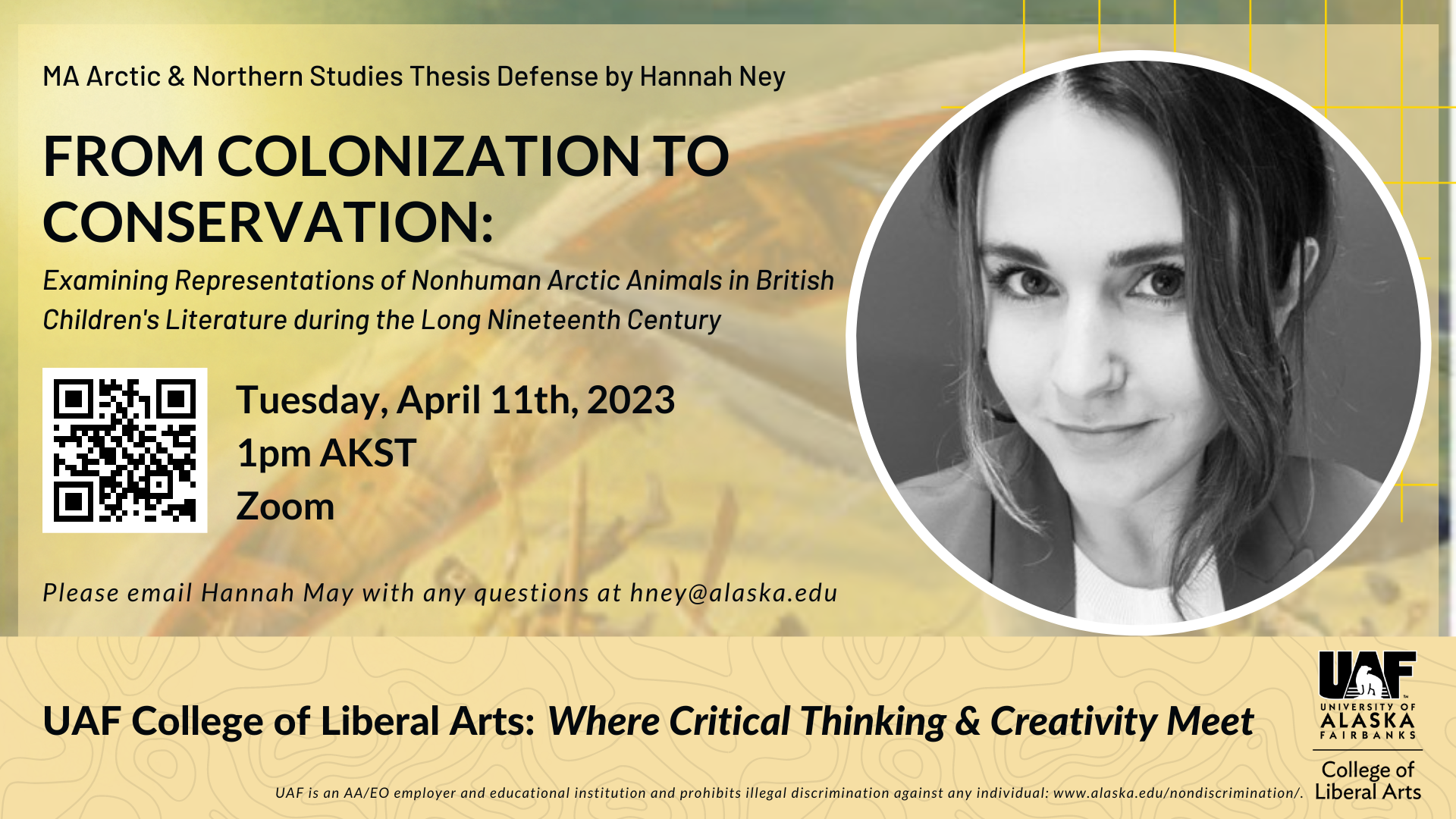From Colonization to Conservation: MA Arctic & Northern Studies Thesis Defense by Hannah Ney

Date: Apr. 11, 2023
Time: 1:00 p.m.
Location: Zoom (https://bit.ly/hney_thesis)
Please join us online via zoom for Hannah Ney's Arctic and Northern Studies MA Thesis Defense, From Colonization to Conservation: Examining Representations of Nonhuman Arctic
Animals in British Children's Literature during the Long Nineteenth Century on Tuesday,
April 11th at 1pm AKST.
Thesis Abstract:
This thesis examines the impact of British children's literature on shaping attitudes towards the Arctic and its nonhuman animals during the long nineteenth century. As the British renewed their interest in the Arctic, authors used children’s literature to convey imperial ambitions and shape beliefs about the region. Using an ecocritical lens, this analysis demonstrates the intentional crafting of animal portrayals to shape children's beliefs about the Arctic and its role in the British empire. The literature showcased proves a significant shift in British attitudes towards the human-environment relationship, moving from exploration to exploitation and ultimately to protection. Early exploration narratives introduced the idea of limitless wildlife populations and encouraged interest in natural history, while midcentury anthropocentric adventure stories reinforced attitudes about empire by pitting humans against nature. Ecocentric Arctic fiction published in the last third of the period challenged ideas about resource colonization and overharvesting, and fostered conversations about conservation by using eco-horror imagery and perspectives of wild creatures to evoke empathy in readers, ultimately decentering people and shifting British beliefs about Arctic nonhuman animals moving into the twentieth century.
Advisors:
Dr. Jennifer Schell, Dr. Brandon Boylan, Dr. Katherine Arndt
This thesis examines the impact of British children's literature on shaping attitudes towards the Arctic and its nonhuman animals during the long nineteenth century. As the British renewed their interest in the Arctic, authors used children’s literature to convey imperial ambitions and shape beliefs about the region. Using an ecocritical lens, this analysis demonstrates the intentional crafting of animal portrayals to shape children's beliefs about the Arctic and its role in the British empire. The literature showcased proves a significant shift in British attitudes towards the human-environment relationship, moving from exploration to exploitation and ultimately to protection. Early exploration narratives introduced the idea of limitless wildlife populations and encouraged interest in natural history, while midcentury anthropocentric adventure stories reinforced attitudes about empire by pitting humans against nature. Ecocentric Arctic fiction published in the last third of the period challenged ideas about resource colonization and overharvesting, and fostered conversations about conservation by using eco-horror imagery and perspectives of wild creatures to evoke empathy in readers, ultimately decentering people and shifting British beliefs about Arctic nonhuman animals moving into the twentieth century.
Advisors:
Dr. Jennifer Schell, Dr. Brandon Boylan, Dr. Katherine Arndt
Hannah Ney's Bio:
Hannah graduated from Grinnell College in 2011 with a degree in anthropology. During her time at Grinnell, she presented "Sinagua Farming and the Landscape: A Micro-environmental GIS Analysis" at the 76th Annual Meeting for the Society for American Archaeology conference. Upon graduation, she was awarded the Ralph Luebben Prize in Anthropology which is given annually to the graduating senior anthropology major who best exemplifies the breadth of anthropology and service to the department. Hannah has always been an avid reader of Arctic fiction, which serves as the inspiration for her thesis. She lives in Minneapolis with her partner and two dogs.
Hannah graduated from Grinnell College in 2011 with a degree in anthropology. During her time at Grinnell, she presented "Sinagua Farming and the Landscape: A Micro-environmental GIS Analysis" at the 76th Annual Meeting for the Society for American Archaeology conference. Upon graduation, she was awarded the Ralph Luebben Prize in Anthropology which is given annually to the graduating senior anthropology major who best exemplifies the breadth of anthropology and service to the department. Hannah has always been an avid reader of Arctic fiction, which serves as the inspiration for her thesis. She lives in Minneapolis with her partner and two dogs.
Acknowledgements:
Hannah is forever indebted to Dr. Jennifer Schell for providing direction, guidance, and encouragement through numerous rewrites and feedback sessions, all while on sabbatical. She would not have completed this thesis without Dr. Schell's enduring support and patience, and, for this, she is extremely grateful to have her as an advisor and Chair. She also thanks Dr. Brandon Boylan for his feedback and suggestions, specifically on Arctic history and politics, and to Dr. Katherine Arndt for her insights into the literature and eye for detail. Thank you also to Aaron Salzman at the UAF Writing Center for spending many hours reviewing this prose and helping edit.
Hannah is forever indebted to Dr. Jennifer Schell for providing direction, guidance, and encouragement through numerous rewrites and feedback sessions, all while on sabbatical. She would not have completed this thesis without Dr. Schell's enduring support and patience, and, for this, she is extremely grateful to have her as an advisor and Chair. She also thanks Dr. Brandon Boylan for his feedback and suggestions, specifically on Arctic history and politics, and to Dr. Katherine Arndt for her insights into the literature and eye for detail. Thank you also to Aaron Salzman at the UAF Writing Center for spending many hours reviewing this prose and helping edit.
Additionally, Hannah thanks the family of Richard Smith Grey for their financial support
throughout her education. The Grey family's generous donations made it possible for
her to study at UAF and take inspiring and engaging courses in Arctic and Northern
Studies and English. Finally, Hannah thanks the Graduate School at UAF for providing
financial assistance through the Degree Completion Fellowship.
This thesis defense is for partial fulfillemnt of the requirements for the degree
of Master of Arts in Arctic and Northern Studies. Please email Hannah May with any questions at hney@alaska.edu


